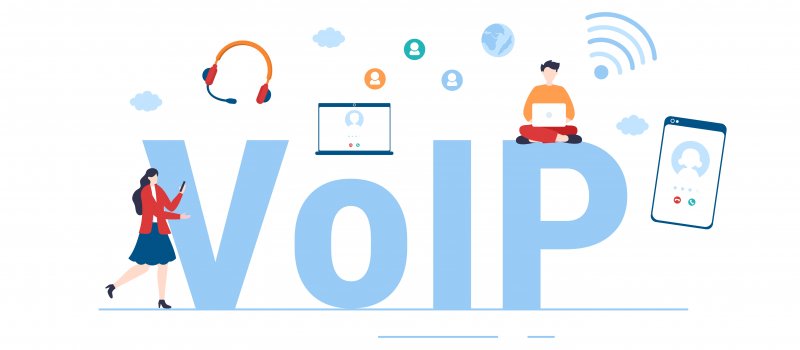Calling others with Voice over Internet Protocol technology has grown into a robust and stable option for connectivity. Many have used it without even realizing it.
For example, in early 2024 a widespread outage knocked out mobile service for thousands of people and businesses. Communications professionals recommended users switch their devices to Wi-Fi calling to regain connectivity while authorities were fixing the problem..
What’s so interesting about that? Wi-Fi calling is a form of VoIP!
VoIP is far more than a mere backup for such emergencies, though; it’s proving to be a practical and cost-effective solution to communications for all kinds of organizations.
At Intermedia, we’ve helped thousands of businesses switch to VoIP, creating many happy users who will never go back to their legacy systems. Discover who VoIP works for and how you can start using it for your company’s communications in a flash.
Key Takeaways:
- VoIP, as the basis of unified communications, transmits your audio, video, and text through digital online signals for unmatched quality and security.
- VoIP is a cost-effective and modern solution for businesses in literally every industry.
- The most advanced contact centers now use VoIP instead of legacy communications.
- You can set up VoIP communications in just a short time with Intermedia’s help.
What Is VoIP, and How Does It Work?
VoIP is a technology that sends audio, video, or text information across the internet as compact digital data packets. In the early days of dial-up internet, VoIP was low-quality and not nearly as reliable as an analog phone line.
With high-speed internet through broadband, VoIP has far surpassed what old-fashioned telephone lines can do. International communications now occur with crystalline clarity in real time with VoIP.
What’s even better is such connections are much less expensive than traditional phone lines. Moreover, because the critical parts are digital and operating from the secure data centers of the provider, anyone can access a VoIP system with an internet-connected device. Just download the app to a PC, smartphone, or tablet, and you can start using VoIP immediately.
You can also use plug-and-play office phones that connect to your system through an Ethernet cable or Wi-Fi. These IP phones look like traditional office phones and are a great solution for workers who prefer this option or companies that need to ensure high-quality audio.
VoIP has no limitations on who you can call. You can reach numbers on cellular networks, landlines, and other VoIP systems with no issues.

Who Should Use VoIP, and What Are Some VoIP Use Cases?
The easy answer is that anyone can (and should) use VoIP. It costs less, is easier to set up, and is more secure than traditional private branch exchanges.
If you need any more proof, there are numerous real-life examples that demonstrate the advantage of switching to VoIP.

Business Phone Systems
Intermedia has worked with numerous organizations to set up VoIP-based phone systems. Whether starting a new service or switching from a legacy system while keeping existing equipment, getting on cloud-based VoIP is easier than many companies could imagine.
We’ve supported businesses in:
Other happy VoIP users come from the fields of government, real estate, and education.
We’ve also assisted various companies in transportation and logistics, a field where employees often must be anywhere and everywhere and where swift communication directly impacts productivity and profitability.
For example, Metropolitan Van and Storage switched to our VoIP-based Unite platform through one of our partners when its legacy service was getting harder to maintain. As a result, the company maintains its five-star ratings as it supports a diverse client base, including international moves for military service members.
Contact Centers
Another service that heavily depends on reliable communications is contact centers. VoIP is now the best way to make these operations more efficient and productive than ever.
For instance, notice that we use the term “contact center” and not “call center.” Old-fashioned call centers could only be reactive departments that focused on voice calls. Because VoIP can handle video and text within a smart device or computer, modern contact centers can seamlessly handle multiple channels of communication and keep conversations organized.
Not only that, but they can integrate with productivity software that simplifies and expedites the collection of vital information and inputting it into your business programs. These include customer relationship management software, enterprise resource planning programs, and electronic health records for those in the medical field.
Where VoIP-based contact centers really shine, though, is in their ability to support hybrid and remote teams. Your agents can work from anywhere in the world in a single system, giving you unmatched flexibility and freedom in hiring and operations.
What Are the Features That Make VoIP Better Than Traditional Phone Systems?
Remember, VoIP doesn’t just handle voice calls; it forms the foundation of a fully unified communications system. You’ll also have access to advanced features that enhance your productivity, including:
- Easy call forwarding
- Auto attendant and interactive voice response
- Call recording, transcription, and archiving
- Easy conferencing
- Call analytics and reporting
Plus, you can use secure artificial intelligence as an assistant on your VoIP-based system to take your productivity and efficiency to a whole new level!
Become a Satisfied VoIP User Today
VoIP has the power to simplify and enhance your communications. Talk to our Intermedia team to see how easy it is to set up your Unite VoIP service and to figure out which plan is right for you.
April 1, 2024
Explore other posts on these topics: Unified Communications





